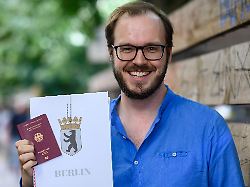No free ticket for the elderly
FDP slows down Faeser’s naturalization law
3/3/2023 7:51 am
The traffic light coalition is finally attempting a modern, simplified naturalization law, and Interior Minister Faeser presents a draft. FDP domestic politicians are now demanding improvements. Older people should not be able to avoid a test, younger people should be able to make a living.
The FDP is behind the planned reform of citizenship law, but some of the ideas for easier naturalization have met with criticism in their ranks. This also includes the plan proposed by Federal Interior Minister Nancy Faeser to pave the way for foreigners over the age of 67 to obtain a German passport without a naturalization test and a written German test.
According to a position paper by the FDP domestic politicians Konstantin Kuhle and Stephan Thomae, the agreement reached in the coalition agreement for easier naturalization of members of the so-called guest worker generation is supported. However, an unlimited reduction in the requirement for all older people is rejected, as are exceptions for certain younger foreigners, as previously provided for in the draft by the Federal Ministry of the Interior.
Hardship cases should be avoided
In their paper, the domestic politicians also demand that only “those who can earn their own living and take care of their families” should be naturalized. This is what the draft bill that the Ministry of the Interior sent to the other departments for approval in January provides for so-called entitlement naturalization. However, the planned reform of citizenship law would not change the exceptions that are possible under the current legal situation in the case of so-called discretionary naturalization. This regulation enables the immigration authorities to also naturalize people who live on state benefits “for reasons of public interest or to avoid particular hardship”. Kuhle and Thomae are also in favor of the “wide holding of naturalization ceremonies” and want to further develop the declaration of loyalty into a “real oath to the Basic Law”.
The draft formulated by Faeser’s house stipulates that a naturalization claim should generally exist after five years in the future. At present, those wishing to naturalize still have to prove that they have been legally resident for at least eight years. In the future, three years should be sufficient for special integration services. The option obligation for children of non-EU foreigners born in Germany is to be abolished. This means that young adults do not have to choose between German citizenship and that of their parents. However, Thomae and Kuhle want people “from the grandchildren generation of those who were naturalized for the first time” to decide on a citizenship.
